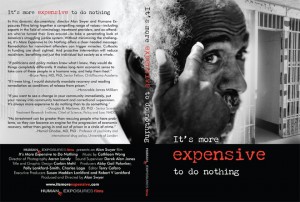Notice: Today’s post is a bit more personal than most as it occurred just across town from me and involves people I know.
The story begins a year before Hurricane Katrina when Joshua Short was the subject of a critically acclaimed documentary about the relationship between political corruption, our failing schools, and the plague of youth gun violence that have been the pernicious back beat to life in New Orleans for much of it’s history. Let’s start with the trailer for Left Behind; be warned that the language is raw and unedited (containing at least one F-bomb and Not Safe For Work).
Hurricane Katrina arrived in mid-filming for the documentary, and to their credit the filmmakers, my old friend and colleague Jason Berry and Vincent Morelli, forged ahead giving an unprecedented view of our at-risk population when under historic levels of stress.
Joshua and his brother, two of the main subjects of the film were living together in an apartment, putting themselves through school, parents long gone from the equation, when it was in production. The young man was inspired with a love of the medium and has since worked for Berry on several occasions. This last Spring he assisted Berry in recording an outdoor Jimmy Buffet concert during the NCAA Men’s Final Four basketball championships.
He was bettering himself, trying to be one of the survivors to claw his way out out of the morass of poverty and disfunction that was his ecosystem. This year, at the age of 25, he had already become that “one good enough adult” that we talk about here on the blog: the one adult who can make a profound difference in the life of a child. He tutored disadvantaged youth in his neighborhood and taught them basketball.
As a matter of fact, according to his brother, he was visiting with one of his mentees when flying lead ended his life. Berry’s words on his blog, American Zombie, are far more eloquent than anything I could say on the subject:
Yesterday, this city…you, me….we are all responsible…took the life of one of its brightest. Joshua was a young man that gave me, and the people in his life, hope. In spite of the horrendous circumstances he was born into, he continually found a way to rise above it all and strived to make better himself and the people he loved. The challenges he faced in his life, as a child, would make most adults crack but he somehow managed to rise above it all. The world of sh*t this city threw at him from the cradle on didn’t harden him or destroy his soul like so many other kids in his circumstances. His hope and kindness humbled me to the point where whenever I, as a 40 year-old adult, would begin to feel sorry for myself, I would think about what Joshua had been through and how ridiculously privileged my own life really is. If he could remain optimistic, I have no business wallowing in self-pity.
Here is an excerpt from NOLA.com’s coverage, including more comments from Berry:
Authorities haven’t publicly discussed exactly what unfolded when Short was shot about 10:40 p.m. on Tuesday. Jonathan said his brother had gone to the Night Out Against Crime gathering to greet friends and visit the youth he was mentoring. Jonathan doesn’t believe the deadly gunfire was meant for either his twin or his friend.
Berry lamented that Joshua Short became the second student profiled in “Left Behind” to fall victim to shooting violence in New Orleans. The first, Mario Pleasant, survived when he was attacked in the middle of filming the documentary.
“For an act of violence like this to take Joshua’s life, it makes me very angry,” Berry said. “I’m fed up with it. The entire point of the documentary, for me, was (to show) the way we are treating our children is leading to this epidemic of violence. I don’t see it getting any better. I don’t see any changes being made.”
That is why everyone needs to develop an interest in these matters. While progress is being made in many places, it is hard to see any here in the Crescent City. This is a cautionary tale about the consequences of neglecting our children and their future. Berry’s documentary showed the complex interrelation between education, lack of opportunity, and juvenile crime in a visceral fashion. Six years later our inattention to those matters has claimed another victim.
Why is it vital to push for change? Because New Orleans is an example of just how bad it can become everywhere if we don’t. This has nothing to do with politics; it has to do with wasted futures and blood on our streets, lives cut short and public money wasted. If your stance is conservative, you should support this because it is the path of fiscal savings and responsibility. If you are liberal, then compassion for the children should guide you along the same path.
I’ve been back in New Orleans for just under a year now, and once more I have read the headlines to learn someone I know was shot in the streets. I completely understand Jason’s depression and fatigue; it often feels like we are treading water at best. Still, there is no way in good conscience to sit on the sidelines while this is the norm anywhere in the United States.
It really is more expensive to do nothing.


 It is no secret that there is a link between education and one’s eventual path in life. Nowhere is this more painfully asserted than by the number of dropouts that end up in jail or prison. In Alabama, the officials have taken notice, and are using a short documentary film to communicate the “stay in school and out of prison” message to the students. Rick Harmon, a reporter for
It is no secret that there is a link between education and one’s eventual path in life. Nowhere is this more painfully asserted than by the number of dropouts that end up in jail or prison. In Alabama, the officials have taken notice, and are using a short documentary film to communicate the “stay in school and out of prison” message to the students. Rick Harmon, a reporter for 

 HUMAN
HUMAN The Newburyport Documentary Film Festival, now in its third year, presents 20 films. Three judges will rate the films in a number of juried categories, and, in addition, an audience-adjudicated award will also be given.
The Newburyport Documentary Film Festival, now in its third year, presents 20 films. Three judges will rate the films in a number of juried categories, and, in addition, an audience-adjudicated award will also be given. Oprah Winfrey has a new cable network debuting next January, and that means a need for programming. In an interesting move, Winfrey has announced a new series of documentaries co-produced with some of her celebrity friends.
Oprah Winfrey has a new cable network debuting next January, and that means a need for programming. In an interesting move, Winfrey has announced a new series of documentaries co-produced with some of her celebrity friends.







